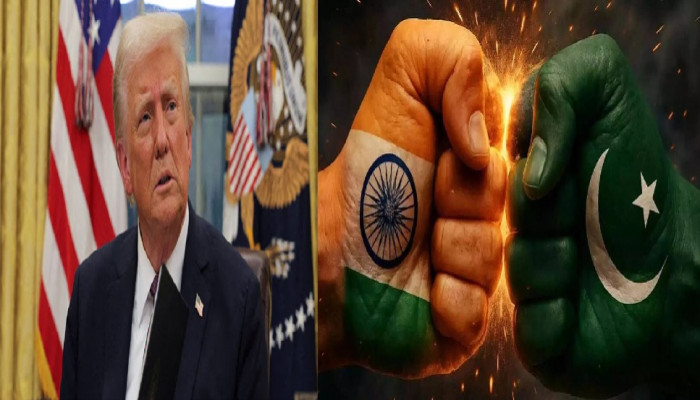U.S. Policy Vacillation: Equating Pakistan’s Terror with India’s Defence
- In Military & Strategic Affairs
- 07:42 PM, May 18, 2025
- Madhu Hebbar
When terrorists struck Pahalgam, Jammu and Kashmir, on April 22, 2025, killing 26 people, the United States had a chance to stand firmly with India, a vital ally, against Pakistan’s aggression. Instead, the U.S. government, through President Donald J. Trump, Vice President JD Vance, and the State Department, wavered, treating Pakistan, the instigator, and India, the defender, as equally culpable. This vacillation, rooted in Pakistan’s lingering strategic value and trade leverage, sacrifices moral clarity for fleeting peace, emboldening terrorists and demanding rebuke.
Trump initially responded decisively. On April 22, he posted on Truth Social, calling the attack, tied to Pakistan’s Lashkar-e-Taiba proxies, “deeply disturbing” and pledging support for India’s anti-terror fight. But by April 25, aboard Air Force One, he muddied the waters, claiming India and Pakistan have clashed over Kashmir for “1,500 years”—a historical falsehood that casts Pakistan’s terrorism as an intractable feud. This set the stage for America’s indecision.
When India launched Operation Sindoor on May 6, striking nine terrorist camps in Pakistan, the U.S. faltered further. Mr. Trump called the escalation “a shame” and urged a swift end, offering no backing for India’s justified strikes. Secretary of State Marco Rubio echoed this, urging both sides to “stay calm,” as if India’s defence matched Pakistan’s provocation.
On May 7, Trump offered to “help” both nations, implying equal fault. Vance, speaking on Fox News on May 8, dismissed the crisis as “none of our business,” sidestepping Pakistan’s role, though he pressed India for talks on May 10 after alarming intelligence. When a ceasefire emerged on May 10, Trump and the State Department praised both leaders, ignoring Pakistan’s instigation.
Why this indecision? America relies on Pakistan, despite the 2011 killing of Osama bin Laden near a Pakistani military academy, which exposed either complicity or incompetence. The US government’s claim that Pakistan’s border and Taliban ties aid U.S. monitoring of terrorists like ISIS-K, while its intelligence and overflight rights remain vital (really?) post-2021 Afghanistan withdrawal. Yet Pakistan’s reliability falters—it shields groups like Lashkar-e-Taiba, fuels anti-Americanism. Pakistan has deepened ties with China’s $62 billion Belt and Road projects, dimming U.S. influence.
Trade plays a role, too. Trump, in a May 13 Fox News interview, claimed he brokered peace with trade deals, targeting Pakistan’s $7.3 billion U.S. trade in 2024, mostly textiles, critical to its fragile economy. India’s $129.2 billion trade, spanning medicine and tech, dwarfs it, rendering India less swayed. India’s May 13 denial of trade discussions exposes America’s overreach, but Pakistan’s economic vulnerability underscores its strategic weight.
This vacillating policy falters. Equating India’s robust trade with Pakistan’s meagre one ignores their disparity and India’s right to self-defence.
Pakistan’s protection of Lashkar-e-Taiba sparked Pahalgam. Talk of “1,500-year” conflicts or “long tensions” misleads, framing a solvable issue as eternal. India, a key ally against China, merits clear support, not comparison to a terror-backing state. The ceasefire succeeded, but America could have pressed Pakistan to dismantle terror networks (using the same trade leverage) instead of feigning neutrality.
This approach undermines U.S. interests. It risks alienating India, signals weakness in Pakistan's terrorism, and erodes global anti-terror norms. Pakistan’s duplicity, evident since bin Laden’s hideout and amplified by BRI ties, demands accountability, not equivocation.
A bolder stance—backing India’s defence and demanding Pakistan curb terrorists—could have blended justice with stability.
By wavering, America chose expediency over principle, missing a chance to lead with clarity. The U.S. must rethink this policy, prioritising allies like India and confronting Pakistan’s double game to secure a safer region.
Disclaimer: The opinions expressed within this article are the personal opinions of the author. MyIndMakers is not responsible for the accuracy, completeness, suitability, or validity of any information on this article. All information is provided on an as-is basis. The information, facts or opinions appearing in the article do not reflect the views of MyindMakers and it does not assume any responsibility or liability for the same.







Comments